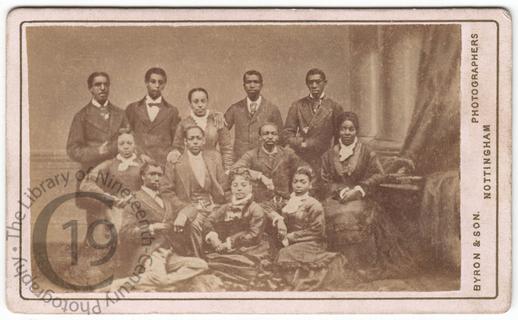
The Fisk Jubilee Singers
A carte-de-visite portrait of the Fisk Jubilee Singers, the first African-American musicians to gain international recognition. The choir was composed entirely of students, most of whom were newly freed slaves. It was formed in 1871 to raise funds for Fisk University, the black college founded in 1866 in Nashville, Tennessee. Their early repertoire consisted mainly of negro spirituals, which many white northern audiences were hearing for the first time. After a rough start, the first US tours eventually raised $40,000 for Fisk University. In 1873 the choir toured Great Britain and Europe for the first time. They returned to Europe two years later, touring from May 1875 to July 1878. This tour raised an estimated $150,000 for the university, which was used to construct Fisk’s first permanent building. Named Jubilee Hall, it still stands today.
Photographed by Byron and Sons of Nottingham.
On 27 February 1874, the Nottinghamshire Guardian reported on the choir’s recent appearance at Nottingham’s Mechanics’ Hall. ‘Slave hymns and melodies are not often heard, and it is rarer still that they are sung before an audience by those to whom they are natural outbursts of feeling and sentiment. The ex-slave students from the circumstances under which they sing can put force and pathos into their performances which is not artificial, and whilst they do this, as careful musicians they are not unmindful of the various adjuncts to good singing. There is a strict adherence to musical technicalities, and a sweet blending of sounds which only trained voices skilfully managed could possibly produce. […] When the doors were thrown open the hall was speedily crowded, and the vocalists met with a hearty reception. Their remarkable songs, which have been aptly described as possessing a fervour, a wildness of melody, a quaintness of expression, and even an occasional grotesqueness, were indeed curious to listen to, but their novelty made them all the more interesting. The audience were evidently highly entertained, and the Jubilee Singers have every reason to be satisfied with the success of their visit to Nottingham.’
Code: 126736




